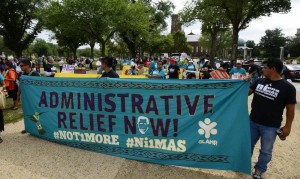By Victor Narro
President Obama’s recent announcement of temporary relief from deportation for an estimated four million undocumented immigrants was a milestone accomplishment for the immigrant rights movement. It was the most sweeping change to this country’s immigration policy since the Immigration Reform and Control Act of 1986. While immigrant rights advocates need to rejoice about this victory, we must also reflect on how it came with a tremendous cost. An estimated seven million undocumented immigrants will not qualify for the temporary relief program and the string of attrition against them will be more acute – deserving vs. undeserving, legal vs. criminal, undocumented vs. documented, felon vs. family. They will continue to live in fear of deportation and separation of their families. Based on post announcement rhetoric from the Republican leadership, the new Congress will move forward with probable border militarization, thereby resulting in even more suffering for refugees trying to cross the border. As is always a major challenge with a policy campaign within a movement for justice, a victory that was won from the bottom up ends up divided when filtered through the political landscape from the top.
There are many challenges that await the immigrant rights movement. We need to approach the next steps with a framework of mindfulness and recognition that we have endured tough internal challenges within the immigrant rights movement to get us to where we are today. We need to work together to improve the health of this movement in order to make it stronger.
Justice flows in one direction towards a higher good, and it is no different for the struggle for immigrant rights. We are all moving forward towards a more just society for the millions of hard working immigrant families in this country and the millions more who will continue to migrate here in search of hopes and dreams. Within our movement, there really is no one strategy, or a single immigrant rights group, or an event that can claim to preempt the direction or landscape – we are all part of it. To do otherwise would defy the logic of a movement in one direction.
Thich Nhat Hanh, Vietnamese Buddhist Zen Master, poet, scholar, and human rights activist, in his Fourth Mindfulness Training, Loving Speech and Deep Listening, states that we must be “determined not to spread news that [we] do not know to be certain and not to utter words that can cause division or discord.” He goes on to state that we must “make daily efforts, in [our] speaking and listening, to nourish [our] capacity for understanding, love, joy, and inclusiveness, and gradually transform anger, violence, and fear that lie deep in [our] consciousness.” It is within this spiritual mindfulness that we must step back, reflect and create a space for principles of unity, inclusivity and compassion to flourish before we begin moving forward with next steps.
Yet, during the past few years, I have witnessed too many occurrences where the desire to obtain the public and media spotlight superseded creating the space for hearing the powerful voices of community members who are impacted every day by the issues we are trying to address. For one, I am not one to claim any clean hands when talking about this issue. I too have been guilty of putting my own personal agenda to get a media hit above the community members who were more deserving of that space. In my daily spiritual Franciscan meditation, I try to strive for a state of mindfulness where I become aware of how my acts impact others. I am not perfect and I don’t think we can ever accomplish a perfect situation of harmony within the movement because we often find ourselves in the midst of crisis after crisis. We can, however, do much more to improve the health of where we are right now as a movement to embrace the principles of unity, inclusivity and compassion in the way that we treat one another.
In an earlier blog post, I argue that the major crossroad where we find ourselves in the fight for humane immigration reform calls us to step back, reflect, and assess our strategies to create a more just and humane society for millions of immigrant families. If managed well, our next steps in this critical moment could bring greater solidarity away from a sometimes-fractious movement. At this crossroad, our leadership model must shift.
We must start from the premise that we all have an important role in the struggle for immigrant rights no matter what organization or network we belong to, and what strategy we implement. I have praised the efforts of immigrant rights groups like the Coalition for Humane Immigrant Rights of Los Angeles (where I spent six great years as Workers’ Rights Project Director), the National Immigration Law Center, and other local and national organizations. Their role has been very instrumental. We must also recognize the important contribution of the grassroots national campaign of NotOneMoreDeportation, a collaborative effort of the National Day Laborer Organizing Network, individuals, organizations, artists, and allies to expose, confront, and overcome unjust immigration laws. Of course, we cannot forget the youth immigrant leadership movements that led to the victory in 2011 with President Obama announcing Deferred Action for Childhood Arrivals (DACA) for young dreamers. These groups were many, and the ones I was most connected with included the California Immigrant Youth Alliance, Dream Team LA, California Dream Network, and Immigrant Youth Collective. There are many other immigrant rights groups that I failed to mention that contributed significantly to the campaign that led President Obama’s temporary relief announcement. What really matters is how we embrace all our efforts and promote moving forward that is inclusive and respectful of the different roles that many of us play in this struggle.
Photograph Courtesy of NDLON
The way immigrant rights activists treat one another must be as just as the justice we seek in the end. This framework of spirituality is the essence of my recent book, Living Peace: Connecting Your Spirituality with Your Work for Justice. I argue that embedded in the work of social justice activism are values that we find in different spiritual faiths like compassion for others, and I encourage social justice activists to embrace them in their daily work. As immigrant rights advocates, we have the foundation of spirituality within us from which we can approach the work together. We must look inward and ask not what we did wrong or point fingers at one another, but rather reflect on our work as immigrant rights activists drawing from our different approaches and perspectives. We can accomplish through a collective process of reflection a movement that promotes inclusion, unity and solidarity building.
As immigrant rights activists, we have the potential to connect through our hearts and let that connection be the driving force that enables us to struggle together, to strategize together, and to win together. In reaching such a level of human relationship, we will stir the spiritual core inside each of us to become the foundation from which we move forward with a united collective strategy. This is true solidarity in action within the social justice movement – our interconnectedness with one other, and the spiritual force of love and compassion for each other.
We as leaders of the immigrant rights movement need to step back and allow undocumented community leaders to assert themselves as more than just storytellers, but as people who can stand and act on their own behalf. We must enable this new wave of community leadership to emerge and lead as we begin to reflect, re-analyze, and shift to new strategies that not only support alternative models but also ensures accountability to a spirit of solidarity with one another. At this pivotal moment, we have to exercise a form of leadership where we co-create the struggle for immigration reform together. If we are to develop a movement that is strong and sustainable, new leadership must emerge, and we must allow it to flourish; we must trust and embrace it.
Victor Narro is the Project Director for the UCLA Labor Center. For more information on his new book, Living Peace: Connecting Your Spirituality with Your Work for Justice, go to https://www.facebook.com/ConnectingSpirituality. He can also be found on Twitter at @narrovictor.







Way cool! Some extremely valid points! I appreciate you writing this write-up and the rest of the site is extremely good.
[…] the past two years, I have embarked on an activist journey of sharing with the immigrant rights and labor movements my prescription and insights on the importance of a spiritual framework on how […]